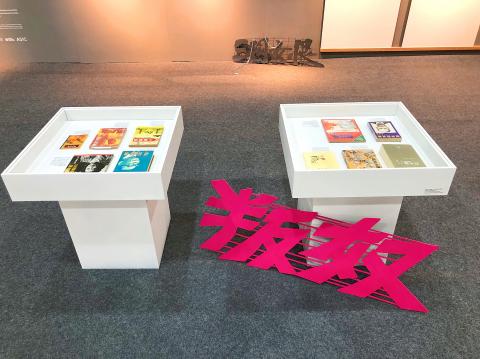Books that were banned in Taiwan during the White Terror era were displayed at the Seoul International Book Fair, which closed yesterday.
The Taipei International Book Exhibition Foundation contributed to the “Banned Books: Spirits from the Bamboo Grove” exhibition at the invitation of the fair, alongside publishers’ associations from Japan, Malaysia, Thailand and Turkey, as well as Seoul National University.
The chief planners of the Taiwanese content were publisher and former presidential adviser Rex How (郝明義), who is also the foundation’s managing supervisor, and Liao Wei-min (廖為民), who wrote The Story of Banned Books in Taiwan (台灣禁書的故事).

Photo courtesy of the Taipei International Book Exhibition Foundation
The organizations collaborated to display the formerly forbidden books to contextualize the history of literary censorship in Asia and to highlight the importance of freedom of the press, How said on Thursday.
Books on display were selected from the vast array of works proscribed during the White Terror era, or the period from 1949 to 1987 when the then-Chinese Nationalist Party (KMT) government ruled via martial law, he said.
The selection was a cross-section of the government’s press censorship, he said.
The government suppressed works of communist literature, such as Karl Marx’s Das Kapital and The Communist Manifesto, and books written by intellectuals who stayed in China after 1949, such as Lu Xun’s (魯迅) The True Story of Ah-Q (阿Q正傳) and Lao She’s (老社) Rickshaw Boy (駱駝祥子), he said.
The Legends of the Condor Heroes (射鵰英雄傳), a Wuxia novel — a genre of fiction about martial artists in ancient China — was banned because its author, Hong Konger Jin Yong (金庸), was suspected of having leftist sympathies and ties to Beijing, How said.
Books whose subject matter touched upon the 228 Massacre or the Japanese colonial era were banned, such as Su Ben’s (史明) Taiwan’s 400 Year History (台灣人四百年史), or books written by liberals who the government persecuted, including Lei Chen (雷震) and Yin Hai-kuang (殷海光), he said.
Chiang Kai-shek (蔣介石) and his son and successor Chiang Ching-kuo (蔣經國) also banned books by people who they held grudges against, such as Bo Yang (柏楊) and Chiang Nan (江南), he said.
Li Ai’s (李敖) books were banned because he was known for spurning authority, while An Anthology of Dangwai Literature (黨外文選) by Yao Chia-wen (姚嘉文) and Chen Chu (陳菊) was banned for being political literature originating from outside the KMT, he said.
The government also suppressed works deemed to challenge traditional sexual mores, such as sociologist Zhang Jingsheng’s (張競生) A History of Sex (性史) and Kuo Liang-hui’s (郭良蕙) The Locked Heart (心鎖), he said.

Rain is to increase from Wednesday morning as Severe Tropical Storm Kong-Rey approaches, with sea warnings to be issued as early as tomorrow afternoon, the Central Weather Administration (CWA) said today. As of 8am, Kong-Rey was 1,050km east-southeast of the Hengchun Peninsula (恆春) heading in a northwesterly direction toward Taiwan, CWA Forecast Center Director Lin Po-tung (林伯東) said. Rainfall is to increase from Wednesday morning, especially in northern Taiwan and Yilan County, he said. A sea warning is possible from tomorrow afternoon, while a land warning may be issued on Wednesday morning, he added. Kong-Rey may intensify into a moderate typhoon as it passes

Hong Kong singer Andy Lau’s (劉德華) concert in Taipei tonight has been cancelled due to Typhoon Kong-rei and is to be held at noon on Saturday instead, the concert organizer SuperDome said in a statement this afternoon. Tonight’s concert at Taipei Arena was to be the first of four consecutive nightly performances by Lau in Taipei, but it was called off at the request of Taipei Metro, the operator of the venue, due to the weather, said the organizer. Taipei Metro said the concert was cancelled out of consideration for the audience’s safety. The decision disappointed a number of Lau’s fans who had

Taiwan yesterday issued warnings to four Chinese coast guard vessels that intruded into restricted waters around the Taiwan-controlled Kinmen Islands, according to the Coast Guard Administration (CGA). The four China Coast Guard ships were detected approaching restricted waters south of Kinmen at around 2 pm yesterday, the CGA’s Kinmen-Matsu Branch said in a statement. The CGA said it immediately deployed four patrol boats to closely monitor the situation. When the Chinese ships with the hull numbers "14512," "14609," "14603" and "14602" separately entered the restricted waters off Fuhsing islet (復興嶼), Zhaishan (翟山), Sinhu (新湖) and Liaoluo (料羅) at 3 pm, the Taiwanese patrol

MUCH-NEEDED: After China demonstrated its capabilities to deploy vertical launching systems, Taiwan needs air defense systems such as NASAMS, a defense expert said The US’ approval of exports of three advanced air defense missile systems to Taiwan signified NATO’s goodwill toward the nation, a Taiwanese defense expert said. The US Defense Security Cooperation Agency on Friday announced the US$1.16 billion sale of the National Advanced Surface-to-Air Missile System (NASAMS) and the US$828 million sale of AN/TPS-77 and AN/TPS-78 radar turnkey systems. The NASAMS is a network that uses ground-launched Air Intercept Missile (AIM)-120 Advanced Medium-Range Air-to-Air Missiles (AMRAAM) to intercept hostile aircraft, drones and cruise missiles. Su Tzu-yun (蘇紫雲), director of defense strategy and resources at the state-funded Institute for National Defense and Security Research, said